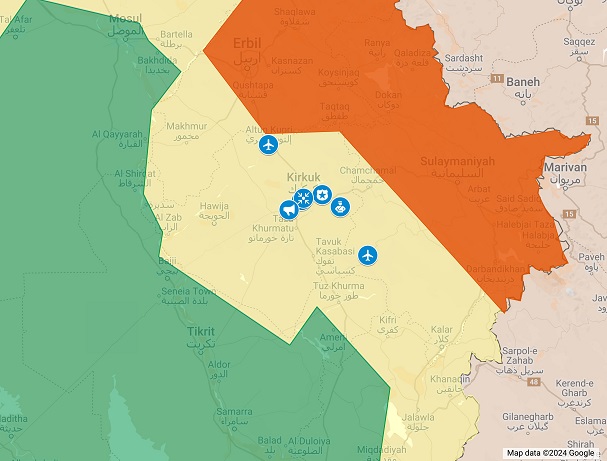1.2K
A biweekly brief of events and news occurred in the disputed territories.
Kirkuk
- On January 21, the Federal Court conducted a hearing regarding two complaints lodged by Kurdish farmers from Topzawa, Sargaran, and Daquq. The farmers sought the annulment of two decisions made by the former al Ba’ath regime, which pertained to the appropriation of land belonging to Kurdish and Turkmen farmers, subsequently allocating it to Arab settlers. Following the hearing, the Federal Court, for the second time, deferred the ruling.
- On January 25, Iranian-backed militias launched a drone attack on the Khor Mor gas fields in the Chamchamal district, temporarily halting production. The assault, occurring at 11 pm, targeted a warehouse within the field, leading to a substantial fire. The consequences rippled across the region, causing power outages for millions of people. The Kurdistan Ministry of Natural Resources (MRN) reported that the attacks disrupted 2,800 megawatts of electricity. Media reports indicate that the militants executed the assault between Laylan and Khalo Bazyani. The Khor Mor gas fields, crucial for providing natural gas to the Kurdistan Region, have been linked to a power plant in Kirkuk since the summer. In a separate incident on January 30, a crashed drone was discovered in the Nabi village of the Perdi subdistrict, north of Kirkuk. According to a security source cited by Shafaq news, the “unidentified drone” was neutralized by ground forces.
- Newly elected Kurdish members of the provincial council paid a visit to the acting governor, Rakan al Jabouri. While the official statement released after the meeting was generic, media reports suggest that during the discussion, the members urged al Jabouri to postpone the inaugural provincial council meeting from February 1 to February 5. Following this meeting, al Jabouri officially rescheduled the first council session to February 5. It’s noteworthy that despite securing a seat in the council, al Jabouri refrained from attending the legal oath-taking, expressing the aspiration to be elected as the governor pending ongoing discussions among the involved parties. Notably, the Arab and Turkmen winners have formed an alliance, while Kurdish parties have initiated separate discussions with various ethnic parties to establish a local government. On January 21, the Independent High Electoral Commission (IHEC) officially ratified the election results. In accordance with election laws, the council is mandated to convene its initial session within fifteen days, with the deadline set to occur before February 6.
- On January 22, a joint military operation between Iranian-backed militias and the Iraqi army was conducted near Jabal Bour in Kirkuk. The collaborative security sweep reached Khala Baziani and Laylan. Following the operation’s conclusion, no official statement has been released. Notably, Iranian-backed militias have played an active role in security operations in Kirkuk since October 16, 2017, when they attacked Peshmerga forces and gained control of the area.
- On January 26, Kirkuk police apprehended an ISIS (Da’esh) terrorist at the Chiman checkpoint, who was en route to Sulaymaniyah. According to the police statement, the detainee is a wanted individual as per the Mosul court’s warrants. In a separate development on January 31, the Iraqi Interior Ministry deployed a fifth assessment committee before transitioning the security responsibility of the province from the military to the local police. As part of an agreement among the parties comprising the current federal government, several provinces are mandated to transfer their security files to the police. Iraqi Interior Minister Abdullah al Shamari, during his visit to Kirkuk on January 25, underscored in a press conference that the security file would indeed be handed over to the local police. Additionally, the police command disclosed plans by the Ministry of Interior to establish an “Internal Security Forces Court.” Previously, infractions and crimes by the police had to be referred to Mosul for court proceedings since no such court existed in Kirkuk.
Shingal (Sinjar)
- On January 24, the funeral service for 41 victims of the Yazidi genocide is scheduled to take place in the Sinjar district. The remains of the victims were transported to the Monument of Yazidi Genocide Victims and interred in four cemeteries within the area. The ceremony was attended by relatives of the victims, as well as prominent Yazidi public and religious figures. In a separate development, officials from the Iraqi government visited an ongoing project involving the construction of a concrete wall in the outskirts of the district, directed towards the Syrian-Iraqi border, with the primary objective of “preventing smuggling.” Despite these endeavors, the district persists in confronting challenges, marked by an absence of fundamental services and security concerns. These issues are compounded by the presence of various forces, including Iranian-backed militias.

